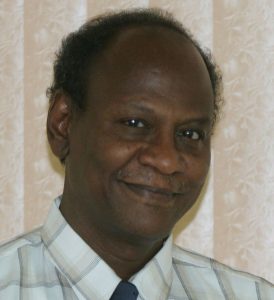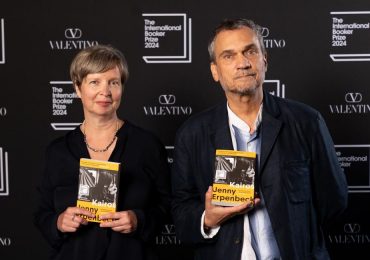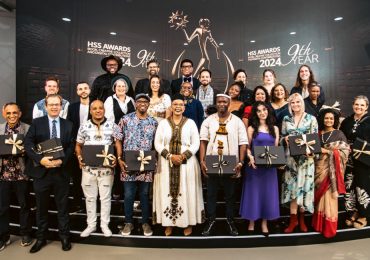
Sudanese writer Bushra al-Fadil has won the 2017 Caine Prize for African Writing for his story ‘The Story of the Girl whose Birds Flew Away’—the first time a translated story has won the prestigious award.
The £10,000 prize was announced at Senate House Library, London, in partnership with SOAS University of London, this evening.
‘The Story of the Girl whose Birds Flew Away’ was translated by Max Shmookler with support from Najlaa Osman Eltom. As a translated story, the prize money will be split, with £7,000 going to Al-Fadil and £3,000 to Shmookler. Each shortlisted writer will receive £500.
Al-Fadil is a Sudanese writer living in Saudi Arabia. He has published four collections of short stories in Arabic; his most recent, Above a City’s Sky, was published in 2012, the same year he won the Altayeb Salih Short Story Award. He holds a PhD in Russian language and literature. At sixty-five, he is the oldest writer ever to be shortlisted for the Caine Prize.
‘The Story of the Girl whose Birds Flew Away’ was originally written in 1979, but only translated and published in English in 2016.
From the Caine Prize:
‘The Story of the Girl Whose Birds Flew Away’ vividly describes life in a bustling market through the eyes of the narrator, who becomes entranced by a beautiful woman he sees there one day. After a series of brief encounters, tragedy unexpectedly befalls the woman and her young female companion.
Chair of judges Nii Ayikwei Parkes praised the story, saying, ‘the winning story is one that explores through metaphor and an altered, inventive mode of perception—including, for the first time in the Caine Prize, illustration—he allure of, and relentless threats to freedom. Rooted in a mix of classical traditions as well as the vernacular contexts of its location, Bushra al-Fadil’s “The Story of the Girl Whose Birds Flew Away” is at once a very modern exploration of how assaulted from all sides and unsupported by those we would turn to for solace we can became mentally exiled in our own lands, edging in to a fantasy existence where we seek to cling to a sort of freedom until ultimately we slip into physical exile.’
You can read the story here, and listen to it here.
The Caine Prize received 148 qualifying short stories from twenty-two African countries this year. Around half were published in Africa. There were five stories on the shortlist, with writers from South Africa, Nigeria and Sudan. Al-Fadil’s story was only the second to be translated from Arabic in the eighteen-year history of the prize, the first being ‘The Tortoise’ by Tunisian writer Hassouna Mosbahi, translated by Peter Clark, which made the shortlist in 2001.
2017 Caine Prize for African Writing shortlist
- Lesley Nneka Arimah (Nigeria) for ‘Who Will Greet You At Home’ published in The New Yorker (USA, 2015)
- Chikodili Emelumadu (Nigeria) for ‘Bush Baby’ published in African Monsters, eds. Margarét Helgadóttir and Jo Thomas (Fox Spirit Books, USA, 2015)
- Bushra al-Fadil (Sudan) for ‘The Story of the Girl whose Birds Flew Away’, translated by Max Shmookler, published in The Book of Khartoum – A City in Short Fiction eds. Raph Cormack & Max Shmookler (Comma Press, UK, 2016)
- Arinze Ifeakandu (Nigeria) for ‘God’s Children Are Little Broken Things’ published in A Public Space 24 (A Public Space Literary Projects Inc., USA, 2016)
- Magogodi oaMphela Makhene (South Africa) for ‘The Virus’ published in The Harvard Review 49 (Houghton Library Harvard University, USA, 2016)
Each of these stories will be published in June, in New Internationalist’s 2017 Caine Prize anthology The Goddess of Mtwara and Other Stories and through co-publishers in 16 African countries, including Jacana Media in South Africa.
This year’s panel of judges was award winning author, poet and editor Nii Ayikwei Parkes (chair); 2007 Caine Prize winner Monica Arac de Nyeko; author and Chair of the English Department at Georgetown University Professor Ricardo Ortiz; Libyan author and human rights campaigner Ghazi Gheblawi; and African literary scholar Dr Ranka Primorac, University of Southampton.





